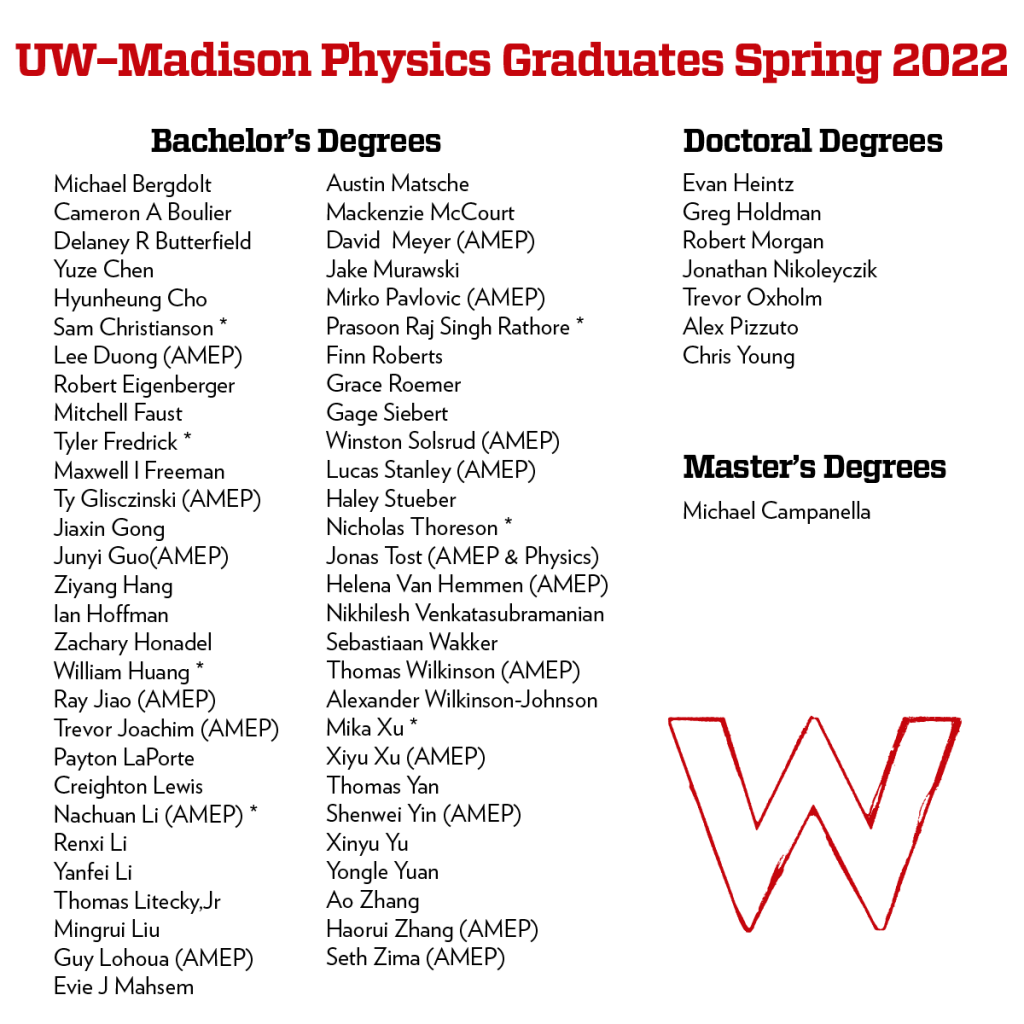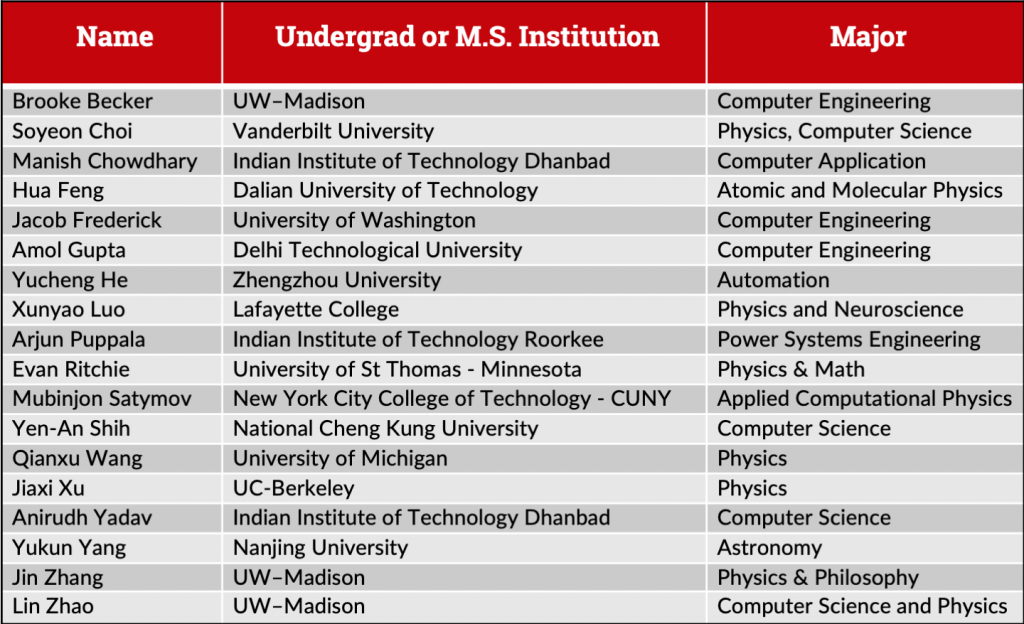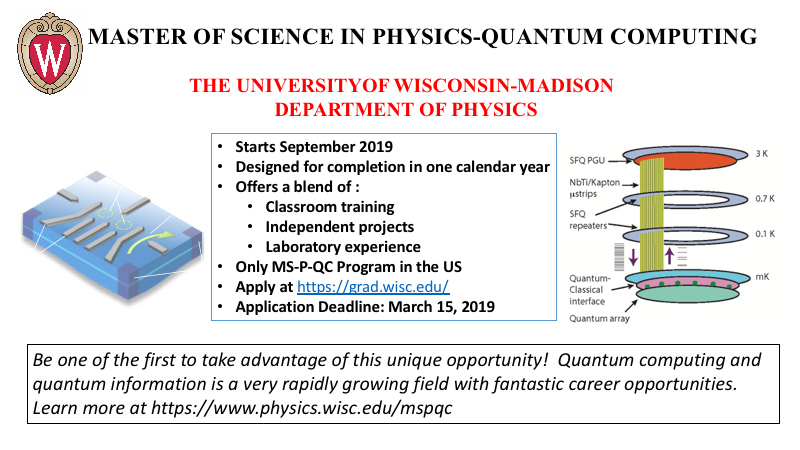Congrats to all of the Physics and AMEP students who are graduating this weekend! Their names are listed below. Best of luck to all of you on your future endeavors — we know you’ll do great things!

Professor Emeritus Lee Pondrom’s textbook Introduction to High Energy Physics: Particle Physics for the Beginner has now been published.
Summary: Elementary particle physics is a mature subject, with a wide variety of topics. Size considerations require any text to make choices in the subject matter, and such choices are to a large extent a matter of taste. Each topic in this text has been selected for its accessibility to as wide an audience of interested readers as possible, without any compromise in mathematical sophistication. There are of necessity a lot of formulas, but every one is derived, and an effort has been made to explain the various steps and clever tricks, and how to avoid pitfalls. The text is supplemented by exercises at the end of each chapter. The reader is urged to do the exercises that are designed to increase one’s skills in the material. The goal of the book is to bring to undergraduates an ability to enjoy this interesting subject.
The UW–Madison Physics Department is pleased to welcome 18 students to the M.S. in Physics – Quantum Computing program. These students make up the third cohort to begin the program and are the largest entering class to date.
“We are really pleased and proud that the MSPQC program continues to grow and prosper in its third year,” says Bob Joynt, MSPQC Program Director and professor of physics. “We look forward to providing a great experience for the class of 2021. A particular focus this year will be the formation of collaborative teams that will push forward research in quantum computing.”
Of note, three women are in the entering class, marking the first time that women have enrolled in MSPQC. Other facts and figures about this year’s cohort include:
The department is following University guidelines and is planning for students to join us in Madison this fall, with in-person instruction. Over the summer, students can attend optional virtual orientation sessions to prepare for the program.
“The pandemic imposed restrictions on our admissions and recruitment activities which forced us to work virtually, but I believe these barriers made our programming more accessible and led to the most diverse and determined incoming cohort of MSPQC students to date,” says Jackson Kennedy, MSPQC coordinator. “Although I have been able to meet our incredibly talented students virtually, I cannot wait to greet them in-person this Fall as we celebrate a long-awaited return to campus.”
In addition to Joynt, the department thanks the other faculty who serve on the MSPQC admissions committee — Alex Levchenko, Robert McDermott, Maxim Vavilov and Deniz Yavuz — for application review. We also thank Michelle Holland and Jackson Kennedy for organizing recruiting efforts.
The MSPQC program welcomed its first students in Fall 2019 – the first-ever class of students in the U.S. to enroll in a quantum computing M.S. degree program. The accelerated program was born out of a recognized need to rapidly train students for the quantum computing workforce and is designed to be completed in 12 months. It provides students with a thorough grounding in the new discipline of quantum information and quantum computing.

After record-breaking application numbers and the most unique recruiting season yet, the Department of Physics is pleased to introduce the 30 students of the incoming Ph.D. class of 2021!
“This year’s incoming Ph.D. class is a remarkably strong and diverse cohort who have overcome truly historic obstacles to join us,” says Ph.D. admissions committee chair, Prof. Shimon Kolkowitz. “I couldn’t be more excited to welcome them to our department and to witness the great work they will accomplish in their time here.”
602 students applied for one of 91 admissions spots, the most applications the department has received in at least the past decade (based on available graduate school data).
Some highlights of the incoming class include:
This year’s incoming class is also the first to ever participate in “Virtual Visit Days,” thanks to the COVID-19 pandemic. Though perhaps not as exciting as visiting campus in person, admitted students could still meet with faculty to discuss research opportunities, participate in discussions and virtual games nights with current students, and watch videos — many newly-created just for these visits — about the University, the city of Madison, and research in our department.
“Thank you to all the prospective students for their engagement and enthusiasm throughout the admissions and virtual visit process,” says Michelle Holland, graduate program coordinator. “We are beyond thrilled to welcome the Class of 2021 to the Physics Ph.D. Program at UW–Madison as we find our ‘new normal’ in being together on campus this fall.”
The department would like to send a huge round of applause to everyone who participated in recruitment this year, especially current graduate students on the recruitment committee: Trevor Oxholm, Abigail Shearrow, Kunal Sanwalka, Susmita Mondal, Winnie Wang. We also thank graduate program coordinators Michelle Holland and Jackson Kennedy for organizing and running the virtual visit days, Dan Bradley for once again providing IT solutions to help the admissions process and visit days run smoothly, and Sarah Perdue for website development and video production.
The department also thanks the Ph.D. admissions committee for their thorough evaluation of the applicants. In addition to Kolkowitz, the committee members are Profs. Keith Bechtol, Stas Boldyrev, Victor Brar, Mark Eriksson, Ke Fang, and Jeff Parker.
One student accepted our admissions offer but has deferred to 2022.
Please join us for a live virtual Commencement ceremony for undergraduate Physics and AMEP majors and Physics PhDs. For more info and a list of graduates, please visit https://www.physics.wisc.edu/commencement-2020/

The Department of Physics is adding a new degree program focused on the growing field of quantum computing. The M.S. in Physics-Quantum Computing is a new Master’s program that will admit its first class in the Fall 2019 semester. The program will provide students with a thorough grounding in the new discipline of quantum information and quantum computing.